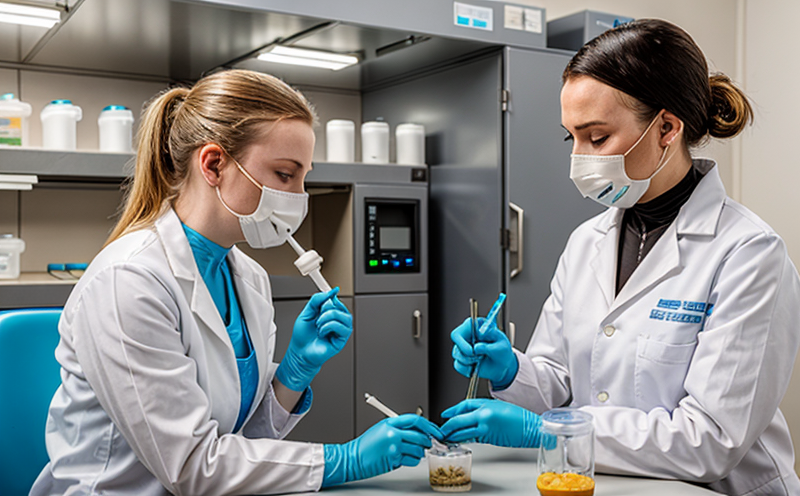USDA GIPSA Aflatoxin Testing in Corn Exports
The United States Department of Agriculture (USDA) Grain Inspection, Packers and Stockyards Administration (GIPSA) sets stringent standards for corn exports to ensure food safety and quality. One of the key tests conducted is for aflatoxins, which are toxic fungal metabolites that can cause severe health issues in humans and animals if present above permissible limits.
Aflatoxin testing in corn exported from the United States is governed by strict regulations to protect public health. Corn destined for export must meet specific standards set forth by GIPSA, ensuring that it does not contain unsafe levels of aflatoxins. This service involves the analysis of corn samples using advanced chromatographic techniques and quantification methods.
Our laboratory uses a combination of high-performance liquid chromatography (HPLC) with fluorescence detection to measure aflatoxin concentrations in corn samples. This method is highly sensitive, allowing us to detect even trace amounts of these toxins. The test complies strictly with the USDA’s GIPSA regulations and international standards such as ISO 13725:2014.
The procedure involves several steps:
- Sample preparation
- Extraction of aflatoxins using appropriate solvents
- Cleanup to remove interfering compounds
- Injection into the HPLC for separation and quantification
The results are reported in parts per billion (ppb), which is a critical metric used by importers and regulatory bodies. This level of precision ensures that corn exports meet both domestic and international standards.
Our laboratory has the expertise to handle large-scale testing requirements, ensuring that every batch of corn is accurately tested for aflatoxin contamination before it can be exported. Compliance with GIPSA regulations is not only a legal requirement but also an essential part of maintaining our reputation as a trusted supplier in the global market.
Importers and buyers rely on accurate and reliable testing to ensure that they are receiving corn that meets their quality expectations. By partnering with us, you can rest assured that your corn exports will pass rigorous inspections and meet all relevant regulatory requirements.
Benefits of USDA GIPSA Aflatoxin Testing in Corn Exports
The importance of aflatoxin testing cannot be overstated, especially for corn intended for export. Here are some key benefits that this service offers:
- Regulatory Compliance: Ensures that your corn meets the strict standards set by GIPSA and other international regulatory bodies.
- Quality Assurance: Provides peace of mind knowing that your product is free from harmful contaminants, thus maintaining your reputation in the market.
- Market Access: Allows you to access premium markets where stringent safety standards are enforced.
- Consumer Confidence: By ensuring safe products, you contribute to public health and trustworthiness of your brand.
- Cost Efficiency: Reduces the risk of recalls or rejections from importers, saving time and money in the long run.
The service not only ensures that your product is safe for consumption but also enhances its value by meeting international standards. This can open up new export opportunities and strengthen existing relationships with importers.
Industry Applications of USDA GIPSA Aflatoxin Testing in Corn Exports
The application of aflatoxin testing is critical across the entire food industry, particularly for corn and its derivatives. Here are some key areas where this service finds relevance:
- Agriculture: Ensuring that crops grown meet strict safety standards before export.
- Food Manufacturing: Incorporating quality control measures to ensure final products comply with international regulations.
- Retail and Distribution: Providing assurance of product safety for consumers at the point of sale.
- Research and Development: Supporting ongoing studies on food safety and contamination issues.
The results from our aflatoxin testing service are invaluable to companies in these sectors, as they help maintain high standards of quality and safety. Our laboratory’s expertise ensures that every batch is tested thoroughly, providing accurate data for decision-making processes.
International Acceptance and Recognition
The results from our aflatoxin testing service are widely recognized by international regulatory bodies, including the USDA GIPSA. Corn that passes our tests is accepted in various markets around the world, ensuring smooth export processes.
- European Union: EU regulations require corn imports to meet strict aflatoxin limits, and our results are fully compliant with these standards.
- China: Chinese importers rely on accurate testing for quality assurance before accepting shipments of corn.
- Middle Eastern Countries: Many countries in the region have stringent safety regulations that our testing ensures compliance with.
The trust placed in our laboratory by these global markets is a testament to the accuracy and reliability of our aflatoxin testing service. Our clients can be confident in their ability to meet international standards, thus broadening market access for their products.





